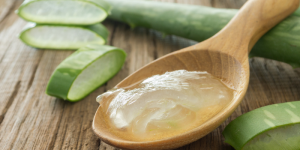Polycystic ovary syndrome, also known as PCOS, is a hormonal endocrine disorder, and is the most common disorder, involving hormones in women. In many cases it involves the presence of numerous small cysts on one or both ovaries, however cysts are not necessary for a PCOS diagnosis, as there are different types of PCOS.
In addition to affecting hormonal balance, PCOS can also lead to other related issues such as insulin resistance and diabetes, excess male hormones, irregular menstrual cycles and, if left unchecked, other complications such as recurrent miscarriages. Fortunately, there are ways to manage PCOS symptoms and keep them from worsening. In addition to medications, other natural approaches are possible as well. One way to do so, depending on the severity of symptoms or the type of PCOS, is by adopting a gluten-free diet, or at least limiting intake of gluten.
Gluten is a protein in many grains such as wheat, rye, barley, and oats. Many people have sensitivities to gluten because it contains prolamins which are difficult for some people to digest. The diet involves eliminating all sources of gluten from one’s diet, including foods that may seem unrelated, such as soy sauce, salad dressing, and canned soups.
PCOS and Gluten: What’s the Connection?
PCOS is a disorder that often leads to the increased production of male hormones. This can cause issues such as difficulty getting pregnant, excess facial hair growth, skin problems, and mood swings. Gluten can cause an increase in certain male hormones that exacerbate these symptoms.
In addition, studies suggest that gluten-containing grains may lead to excess insulin secretion, which can further worsen the symptoms of PCOS. Because insulin resistance is a common symptom of PCOS, women with PCOS often have difficulty processing carbs and experience high blood sugar or bloating and increased discomfort after meals.
Managing PCOS by Limiting and Avoiding Gluten

A low gluten diet can help reduce the symptoms related to PCOS by lowering insulin resistance, blood sugar, and the amount of certain male hormones in your body. This condition-induced insulin resistance can cause high blood sugar, which in turn, can lead to diabetes.
It can also help prevent the progression of complications related to PCOS. For example, a low gluten diet may also help with weight loss, an added benefit as many women with PCOS often suffer from unwanted weight gain and difficulties in losing weight. This possible added weight loss from dietary changes and cuts can reduce the risk of high blood pressure and limit the risk of diabetes.
For women with PCOS who consistently limit gluten in their diet, an added benefit may be seen with menstrual cycles becoming more regular. This is because a gluten-free, or low-gluten diet can reduce insulin resistance, which often causes irregular menstrual cycles.
Additional benefits of a change in diet can also help reduce acne breakouts related to PCOS.
Because gluten can promote an increase in certain male hormone production, symptoms such as acne breakouts and facial hair growth, which are common symptoms of PCOS, can be managed by reducing the number of male hormones in your body, or by reducing factors which can increase the level of these hormones.
Who Should Avoid Gluten?
There’s no doubt that anyone diagnosed with an autoimmune disease such as celiac disease, gluten sensitivity, or dermatitis herpetiformis should avoid gluten at all costs. These diseases cause an immune response to gluten, meaning the body mistakes it for an invading pathogen, which can cause severe damage to the small intestine.
However, anyone with PCOS interested in exploring a gluten-free diet may benefit from the dietary change as well in managing symptoms and preventing complications such as breakouts, and diabetes risks. One thing that is nice about trying to cut gluten is that it can be safe to do and proper food exchanges can cut gluten while still providing adequate nutrients in the diet.
Tips for Cutting Gluten Intake to Manage PCOS
It is important to note that no research has proven that going gluten-free is a treatment for PCOS symptoms. In fact, some women with PCOS cut out gluten to find that their symptoms show little improvement. However, if you’re considering cutting down on the gluten intake in an attempt to manage your PCOS symptoms, you’ll want to ensure you do it right. Begin by checking with a doctor to receive their dietary advice or recommendations about other possible dietary changes and follow these tips to make the transition as easy as possible.
This can also be a simple food change of avoiding or limiting processed foods in general and selecting more whole food options as processed foods in general contain higher levels of saturated or hydrogenated fats which can increase estrogen production, lead to weight gain and worsen PCOS symptoms.
When it comes to drastic dietary changes, nutrition is key. Thus, it is important to understand food swaps and how to ensure proper dietary necessities are being met. Consulting with your general doctor or a PCOS-knowledgeable dietician can be helpful in ensuring you are consuming adequate nutrients to fuel your body, improve your fertility and aid in easing PCOS symptoms.
Like all lifestyle changes, consistency is key. To reap the most benefits from dietary changes, long-term, the key is to make changes that allow you to be consistent and keep in place for extended amounts of time. If going completely gluten-free seems too drastic or you find yourself slipping more often than not, try making small changes such as switching from traditional pasta to veggie-based pasta, or substituting your lunchtime sandwich for a hearty salad.
You may not need to go completely gluten free, but having some gluten-free options can help reduce the amount in your diet. Instead of the traditional baked goods around the house, find one or two gluten-free treats you enjoy to have as your go-to baking recipe.
Like all health-inspired dietary changes, it’s important to keep track of your symptoms and the effect of the dietary changes as you go. If you find improvement with your PCOS symptoms, then you’re on the right track and know you can stay consistent with where you’re at. If you start feeling worse or having other symptoms kick up such as fatigue, shakiness or digestive issues, then it’s time to reevaluate your diet to determine what nutrients are missing or what newly introduced foods may not be agreeing with you.
Changes are hard, slipping up is natural and a little bit of trial and error is key in finding the perfect balance to a new lifestyle change. If you find yourself truly struggling don’t hesitate to seek help with a doctor, specialist or certified nutritionist to cheer you on and help you on your journey.
All in all, when it comes to cutting back on gluten, the change can have several benefits for people who have PCOS, including a reduction in insulin resistance, hormonal balance, weight loss, menstrual cycle regulation, and more. While it may seem like an odd cut in the diet, it can be a good starting place for women looking to ease their PCOS symptoms without resorting to medications and more drastic measures.




